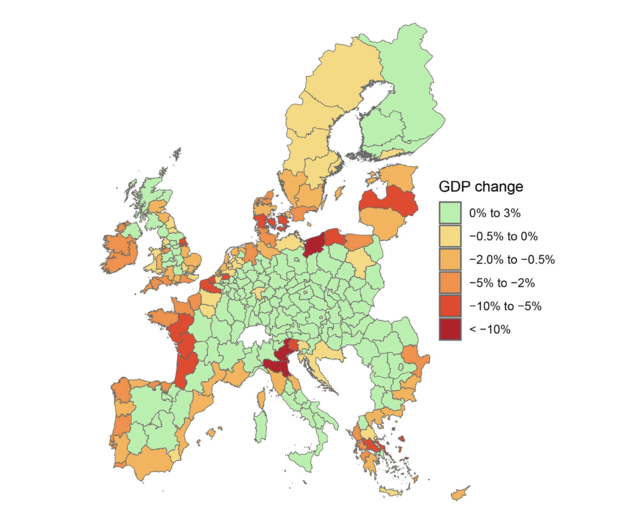
Sea level rise could cost Europe billions in economic losses, study finds
Some regions of Europe could see “devastating” economic losses in the coming decades due to the rising oceans, researchers say. A new study found that under the worst-case scenario for emissions and sea level rise, the European Union and United Kingdom could lose 872 billion Euros (about $950 billion) by the end of this century, with many regions within them suffering GDP losses between 10% and 21%.
The study, published Thursday in the journal Scientific Reports, analyzed the economic impacts of sea level rise for 271 European regions. Researchers conducted their analysis based on estimates of high greenhouse gas emissions, which drive global temperature increases, a process that causes sea levels to rise. For the study, they also based their findings on there being no new coastal protection measures beyond 2015, though countries could take action to lessen the impact.
What they found was that the EU and U.K. — both of which are among the 12 biggest contributors to the global trade of goods, according to the EU — would lose a combined 1.26% of their GDP, about $950 billion. But researchers said that even more critical is the loss that could be suffered by smaller locales, especially coastal areas within them.
Venice, could see a GDP loss of 20.84%, researchers found, while Poland’s Zachodniopomorskie could see a loss of just over 12% and Italy’s Emilia-Romagna region could see a loss of 10.16%. In the U.K., England’s Lincolnshire was found to be the most at-risk economically, with an estimated GDP loss of 20.1% by 2100.
Such amounts, the study says, are “substantial, if not catastrophic.”
And that doesn’t factor in the potential impact of passing any of Earth’s tipping points, which according to the European Space Agency are “critical thresholds in that, if exceeded, can lead to irreversible consequences.”
“[What will happen] is still to an extent in the cards, but we have deliberately taken the worst-case scenario available … to see what happens if we do nothing,” the study’s lead author, Ignasi Cortés Arbués, said at a briefing. “It is about the hot spots. …The places without any adaptations essentially disappear.”
“Distribution of economic damages due to climate‑driven sea‑level rise across European regions and sectors”/Scientific Reports
Climate hazards such as sea level rise can take a major toll on the economy, he said, and even “trigger a restructuring.”
“This means that certain sectors will become more important to the GDP of the region and that’s because of the impact of the hazard,” he said. “…If you have a natural disaster, it is quite normal that right after, the construction sector benefits a lot … but what does that mean for other sectors?”
Cortés Arbués and his team analyzed how a number of economic sectors — agriculture, industry, construction, utilities logistics, transport, private services and public services — would be impacted by sea level rise for various regions. Unlike construction, which is estimated to only grow as sea levels rise because of its need to aid in recovery, agriculture and public services would likely see losses, the study found.
“Our findings confirm that a national-level analysis masks regional disparities, and underestimates potentially systemic damages to vulnerable coastal regions, which could be an order of magnitude larger than national GDP losses,” the study says. “…A higher awareness of these impacts is essential to develop effective climate change adaptation strategies.”
Filatova said that their findings help provide a better understanding of the economic shock that climate change-related events can cause. And even though their research focused on European nations, she said their analyses can — and should — be considered across the world.
“Europe is relatively well-protected even compared to North America,” she said. “It would be extremely important to reproduce similar analyses.”
More
More
Source: cbsnews.com
